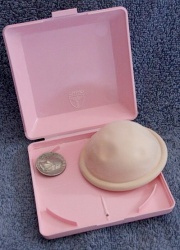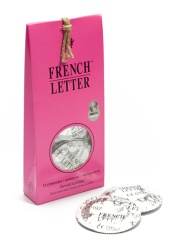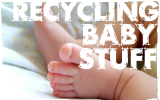How can I reuse or recycle diaphragms?
 Cor, it’s been a busy week here on Recycle This – giveaways for washable pads, a Mooncup, Jam Sponges and Fairtrade condoms!
Cor, it’s been a busy week here on Recycle This – giveaways for washable pads, a Mooncup, Jam Sponges and Fairtrade condoms!
It’s nearly time to bring our women’s & sexual health week to a close though but I had one more “how can I recycle this?” query before we finish: how can I reuse or recycle diaphragms?
Latex rubber diaphragms degrade over time so should be replaced every couple of years. They need replacing even quicker if they come into contact with any oil-based lubricants. Silicone ones last longer (up to 10 years in some cases) but still need replacing eventually.
They also need replacing if the woman’s weight fluctuates up or down by 10lb (4.5 kg), or if she experiences a pregnancy lasting 14 weeks or longer.
Between one thing and another, we’re not talking about the type of waste associated with more disposable forms of contraception but there will still be a lot hitting end-of-life with the easiest option to be dumped into landfill. But is there anything else that can be done with them?
And what about their cases?





 In honour of International Women’s Day at the start of the week, we’ve had a week of women’s & sexual health themed posts and giveaways. Up until now, they’ve been more focused on the wonderful range of green sanitary options available but I wanted to shift things on a bit today.
In honour of International Women’s Day at the start of the week, we’ve had a week of women’s & sexual health themed posts and giveaways. Up until now, they’ve been more focused on the wonderful range of green sanitary options available but I wanted to shift things on a bit today.














